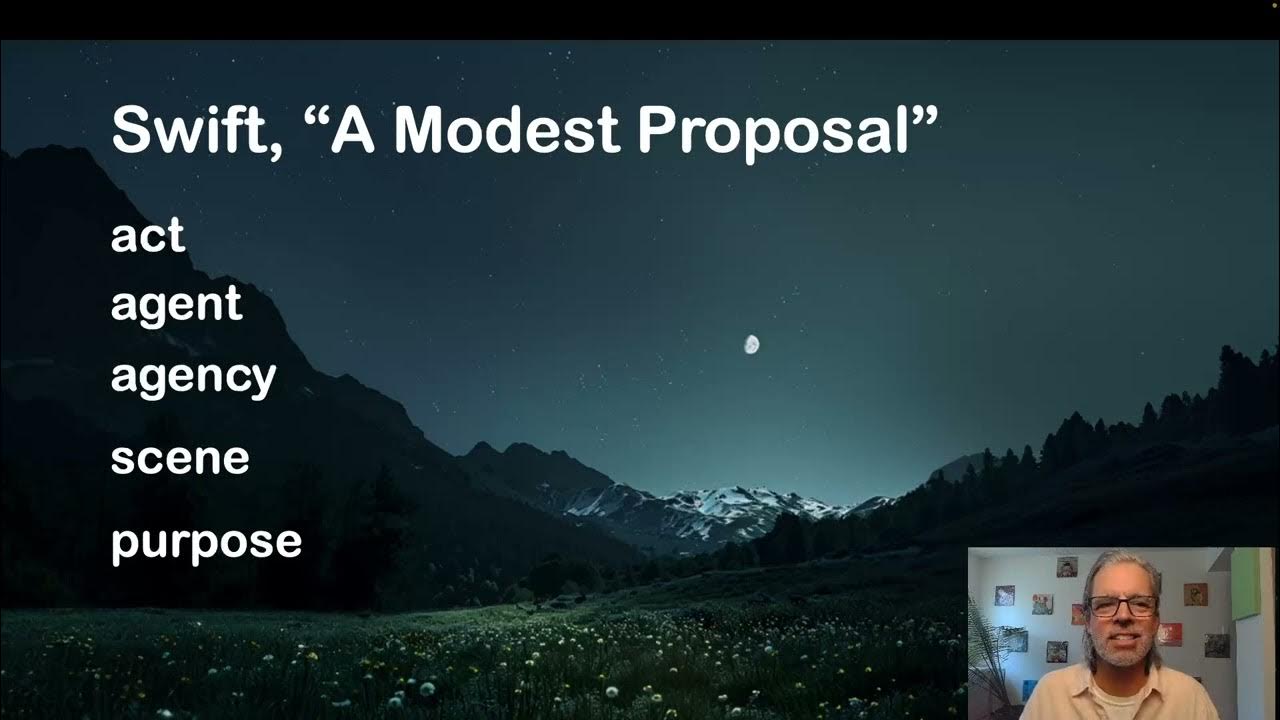48 Weekly Review
Summary
TLDR本周视频回顾由Dr. Grippin主讲,重点分析了Amy Tan的散文《母语》。Tan在文中探讨了找到适合自己写作的受众和语言风格的重要性。她意识到使用非个人化的语言与大型听众群体交流时,她失去了语言的效力和个人身份特质。她提倡使用简单、直接的语言来表达思想,避免使用复杂的术语和过去完成时态,这些会使语言失去活力和时效性。此外,视频还讨论了如何通过归纳推理来构建论文论点,强调了避免选择性使用研究结果(即“cherry picking”)的重要性。最后,Dr. Grippin介绍了如何将人工智能整合到研究过程中,以提高效率和避免偏见。
Takeaways
- 📚 本周课程主要讨论了Amy Tan的散文《Mother Tongue》,她通过这篇文章探讨了如何找到写作的合适受众,并意识到为了成为成功的作家,她需要使用什么样的语言。
- 🎬 Amy Tan是《喜福会》一书的作者,该书后来被改编成电影。在她的写作过程中,她意识到自己之前使用的是错误的语言风格。
- 🗣️ Amy Tan发现她与母亲交流时使用的个人语言,与她的身份认同相关,是她写作中需要的语言。
- 🚫 她决定摒弃使用过的一些语言形式,包括名词化形式(如将动词'intersect'变为名词'intersection'),因为这些形式削弱了动作和时间感。
- 🕒 过去完成时态也是她避免使用的语言之一,因为它将读者的注意力从当前拉回到过去,削弱了语言的即时性和生动性。
- ❌ 她反对使用条件句,尤其是'if-then'结构,因为这种结构会分散读者的注意力,使他们从事实转移到可能性上。
- 📉 她认为之前的语言风格使事情变得不必要地复杂,使用了比必要更多的时间和空间。
- 🔑 Amy Tan强调使用简单、直接的语言来表达意思,这样更有效,也更有力量。
- 🧠 她认为学习用于考试的英语与日常交流使用的英语不同,考试英语不是日常生活中人们用来沟通的语言。
- 🔍 本周还讨论了如何将AI整合到研究中,最佳实践是在研究过程的开始和结束时使用AI。
- 🤖 AI可以帮助避免研究中的选择性偏见(cherry picking),确保研究的全面性和客观性。
- 📝 AI还可以在写作过程结束时提供帮助,比如通过提出建议或指出论证中的弱点。
- 💡 虽然AI是一个强大的工具,但过度依赖它可能会错过通过研究和写作来发展思维的机会。
Q & A
艾米·谭在她的散文《母语》中讨论了什么主题?
-艾米·谭在她的散文《母语》中讨论了她如何找到写作的合适受众,并意识到为了成为一个成功的作家,她需要使用什么样的语言。
艾米·谭意识到使用错误的语言会对她有什么影响?
-艾米·谭意识到使用错误的语言会降低她的演讲效果,使她的语言失去活力和时间感,并且削弱了她个人身份的特殊品质。
什么是‘名词化形式’,并且艾米·谭为什么认为它对她的写作不利?
-‘名词化形式’是指将动词转换成名词的形式,如将'intersect'变为'intersection'。艾米·谭认为这种形式的语言削弱了动作和时间感,使语言失去了生命力。
艾米·谭对于过去完成时态的看法是什么?
-艾米·谭认为过去完成时态会将读者或听众的注意力从当前时刻带走,分散到不确定的过去时间,这使得语言效果减弱。
艾米·谭在她的写作中避免使用哪些类型的语言?
-艾米·谭避免使用使事情复杂化的语言,比如名词化形式、过去完成时态和条件句,因为这些都会分散注意力,降低语言的效率和表现力。
艾米·谭认为标准化考试中的英语与日常交流的英语有何不同?
-艾米·谭认为标准化考试中的英语与日常交流的英语不同,考试英语不是日常沟通的语言,也不是她与母亲交流时使用的语言。
艾米·谭对于使用简单语言的看法是什么?
-艾米·谭提倡使用简单语言,以便每个人都能理解,而不是使用复杂的语言,浪费更多的时间和空间来表达相同的意思。
艾萨克·牛顿在他的著作《自然哲学的数学原理》中支持了哪种推理方式?
-艾萨克·牛顿在他的著作中支持了归纳推理,即从具体的观察出发,通过概括找到规律或规则。
在写作论文时,如何使用归纳推理来形成结论?
-在写作论文时,通过归纳推理,我们可以从找到的引用和观察中概括出结论,这个结论将成为我们论文的主张或论点。
为什么在写作论文时避免选择性地使用研究结果(即'cherry picking')很重要?
-避免选择性地使用研究结果很重要,因为这会导致偏见和不准确的结论,而科学研究和论文写作应该追求客观性和全面性。
AI在研究和写作过程中的最佳使用时机是什么?
-AI在研究和写作过程中的最佳使用时机是在开始阶段提供搜索方向的建议,以及在写作结束阶段提供对论文的反馈和建议。
为什么我们不应该过度依赖AI进行研究和写作?
-我们不应该过度依赖AI,因为研究和写作的过程有助于我们发展和改进思维结构,如果过度依赖AI,我们将失去这个发展思维的机会。
Outlines
📚 课程回顾与Amy Tan的《母语》
本周课程回顾了Amy Tan的散文《母语》,她通过这篇文章探讨了如何找到写作的合适受众,并意识到为了成为成功的作家,她需要使用何种语言。Tan发现,当她在公众场合使用错误的语言时,她的演讲效果并不理想。特别是当她的母亲在听众中时,她意识到她使用的是错误的语言,因为她与母亲交流时使用的个人语言才是对她最有意义的,这与她的身份认同有关。她指出,在她成为成功作家之前,她曾使用了一些错误的语言形式,如过度使用名词化形式(如将动词'intersect'变为名词'intersection'),这削弱了语言的动态感和时间感。此外,她还提到了过去完成时态和条件句,这些都使她的语言表达变得复杂和低效。Tan强调,为了提高表达效率,应该使用更简洁、更生动的语言。
🔍 牛顿的归纳推理与写作中的逻辑
本段讨论了艾萨克·牛顿在其1687年出版的《自然哲学的数学原理》中提出的归纳推理概念。归纳推理是从具体观察开始,通过概括找到规律或规则的过程。例如,如果不同地方的科学家都发现冰在0度融化,那么我们可以通过归纳推理得出冰在零度融化的结论。这种方法帮助欧洲走出黑暗时代,进入启蒙时代,促进了工业和科学的快速发展。在写作中,我们同样使用归纳推理来形成结论,这些结论成为我们文章的主张,而通过研究找到的引用则作为支持这些主张的证据。此外,本段还批评了在人文学科中常见的选择性引用(cherry picking)现象,即只选择支持自己观点的引用而忽略其他,这种做法与科学精神相悖。
🤖 AI在研究和写作中的应用
本段探讨了如何将人工智能(AI)整合到研究和写作过程中。建议在研究过程的开始和结束时使用AI。开始时,AI可以提供搜索方向或建议,帮助避免选择性偏见(cherry picking)。结束时,AI可以用来审查已完成的文章,提出改进建议或指出论点的弱点。AI对于回答特定问题特别有用,比如询问历史事件的反应或解释文学作品的含义。然而,我们不应过度依赖AI,因为通过研究和写作,我们可以发展和改进自己的思维结构。如果过分依赖AI,我们可能会失去发展思维的机会。
🚀 下周课程预告与总结
在最后一段中,预告了下周的课程将对本周内容进行总结。同时提醒学生,通过研究和写作,他们可以发展自己的思维,而不应仅仅依赖AI。鼓励学生在写作过程中,将思维从抽象转化为具体,这有助于构建更强大的思维连接。这段也强调了研究和写作对于个人思维发展的重要性,并提醒大家下周将继续深入探讨这些主题。
Mindmap
Keywords
💡Amy Tan
💡母语
💡名义化形式
💡过去完成时
💡条件句
💡注意力分散
💡艾萨克·牛顿
💡归纳推理
💡逻辑
💡选择性引用
💡人工智能
Highlights
艾米·谭在她的文章《母语》中探讨了如何找到写作的合适受众,并意识到她需要使用的语言类型。
谭发现她之前在公共演讲中使用的语言是错误的,因为它与她的身份和个人语言无关。
谭认为,将动词转换为名词形式(如intersect变为intersection)会使语言失去动作和时间感。
谭指出,过去完成时(如过去完成时的例子)会将读者从当前时刻带走,分散注意力。
谭批评了条件句(如'如果...那么...'结构)因为它们将注意力从事实转移到可能性上。
谭不喜欢她早期语言风格中的复杂性,认为应该用更少的时间和空间来表达意思。
谭强调使用动词而不是名词来保持语言的活力和动作感。
谭认为,她之前学习的英语并不适合日常交流,而是考试专用英语。
谭提倡在日常生活中使用简单易懂的语言,而不是故意混淆视听。
艾萨克·牛顿在1687年出版的《自然哲学的数学原理》中支持归纳推理的概念。
牛顿认为科学家应该通过归纳推理来确定真理,这对欧洲启蒙运动和科学进步有重要贡献。
在写作论文时,我们使用归纳推理来得出结论,这些结论成为我们论文的主张。
避免在研究中选择性地挑选支持自己观点的证据,这是一种被称为'cherry picking'的错误方法。
AI可以在研究过程的开始和结束时提供帮助,避免选择性偏见。
AI可以帮助我们更好地理解问题的各个方面,包括我们自己和对手的观点。
AI可以用于写作过程的最后阶段,为已完成的论文提供建议或指出论证中的弱点。
AI适合回答那些直接且快速的问题,而不是过度依赖它来发展我们的思维结构。
通过研究和写作,我们可以帮助自己的思维发展,而过度依赖AI可能会错过这个机会。
Transcripts
hello again I'm Dr grippin it's time for
our weekly review before we get into it
there's my email address as always
please email me if you have any
questions or comments about the course
at aaronin
gmail.com now we started off looking at
one of our main literary texts in the
course this week was Amy Tan's essay
mother tongue She Wrote the very
successful book Joy Luck Club which was
made into a movie and she talked in
talks in her essay mother tongue about
how she came to find the appropriate
audience for her writing and in turn
then she realized what kind of language
she needed to use to become a successful
writer and one of the things she
realized was that she was using the
wrong kind of speech when she was going
around talking to Big groups of people
and one day when her mother was in the
audience she found that the the wrong
the speech was wrong because it was not
the kind of speech that was most
meaningful to her and the speech that
was meaningful to her was her personal
speech that she used with her mother and
that was related to her identity as well
and that she had been losing both the
effectiveness of her speech and the
special qualities of her identity when
she was using this other kind of wrong
language she calls it and let's take a
look at what she identified as the wrong
language that was she was using before
she became a successful writer and what
she moved away from to eventually become
the writer that that she is today one of
them was nominalized forms she said her
language was burdened with these and
that means noun forms for example taking
a verb like intersect and changing it to
intersection and imagine to
imagination and so some of the examp an
example of this kind of nominalized form
that she was using was the intersection
of memory and Imagination and she
thought that she says in mother tongue
that that is the wrong kind of language
for her I know many people want to write
this way they like to use the bigger
words because uh uh standardized tests
like the college entrance exam expects
us to use these kind of words but they
were not for her what happens with these
nominalized forms is that you take a
verb which expresses motion and motion
happens in time and you take away the
action and the sense of time when you
convert it to a noun so now there's no
more sense of movement and no sense of
time and you lose a sense of Life
literally because life occurs in time
changes happen and nouns remove some of
that sense so nominalized forms were one
thing that she wanted to get away from
another was past perfect tenses and we
know from the example of some other
languages like Chinese you don't need a
past perfect tense and this is another
thing that was burdening her language
and a reason why probably is that it
removes us from the present and sends us
to somewhere that we can't see even we
can't imagine it many times so imagine
we we are reading this essay mother
tongue now at this moment we're reading
mother tongue and Amy Tan tells us about
a time in the past when she was giving
another speech so our imagination goes
to the past and then at that time she
had given the speech six other times in
different places or whatever so now our
imagination divides into six different
pieces what time we don't know six
different times we don't know what
places we don't know six different
places so our imagination just dissolved
into six something and we don't know
what they are she took us from the PE
present back back again and our our
attention divides into six pieces and so
this is less effective kind of language
it's taking us away from our present
experience and she she gives an example
of this she uses it herself the past
perfect tense the same talk I had
already given half a dozen times and
that divides our attention takes it away
from the present she also talks about
conditional phrases which are usually if
then phrases and that has those have the
same type of effect that we're talking
about the actual fact and then from the
fact we take our attention move it away
to something else that's not the fact
but if possibly maybe this happens then
something else so instead of having our
attention in one place it's divided over
with a second place which is not even
real it's just simply a possibility so
these are ways of dividing our attention
and in general the things that Amy Tan
did not like in her old style of
language usage was that her language
makes make made things more complicated
than they needed to be they also used
more time and space than necessary if
you take a meaning and instead of
expressing it in a short word you
express it in a longer word you're
you're using more space to express the
same amount and more space also takes
more time language exists exists in time
so when you're making longer words
you're using more time and becoming less
efficient you want to use less time and
less space to express your meaning
that's the more efficient and more
powerful way the wrong kind of language
she had been using Amy Tan she had been
using words that take away the sense of
action instead of using verbs she was
using nouns and so we don't have this
sense of motion of life and the some of
the language that she was using was hard
to picture we just have nothing to see
in our mind According to some of these
uses uses of language that she had
before she became
successful and she uh makes a point
which I agree with I want to reiterate
that the English that she had been
learning as a 15-year-old student the
English for the ESS at test and the
college entrance exam and all that
that's not the English of everyday
communication not the English that she
uses with her mom not the English that
normal people use to communicate with
each other just remember on the uh
college entrance exam or this SAT test
there's a lot of math on there too math
problems right that's not the math that
you use in everyday life it's the same
thing with English there's English for
the test that's not the English for
everyday life so let's just not get
confused when we're in everyday life
let's use Simple language that everyone
can understand instead of trying to
confuse people and use more time and
space to say the same meaning we'll just
try to focus on getting some good ideas
and saying them clearly so everyone can
understand
now this week we also talked about Sir
Isaac Newton and the very famous book
that he published in
1687 one of the most influential books
in The History of Science called
mathematical principles of natural
philosophy and in it he uh endorses the
idea of induction or inductive reasoning
and you remember what that is is
beginning from specific observations in
the material world
and then using the power that human
Minds have is generalizing trying to
find a pattern or a rule and
generalizing some kind of main idea or a
rule a law um or a a basic thought a
main idea uh by the process of inductive
reasoning or induction right so for
example back in 1687 when Sir Isaac
Newton was publishing Maybe maybe a
scientist discovered that when you raise
the temperature of ice to 0° then it
melts and also a scientist in China
discovered when you raise the
temperature of ice to 0 degrees it melts
and likewise in Germany someone
discovered the same thing then if we
take these three pieces of data by the
process of inductive reasoning we can
reach the conclusion that ice melts at
zero Sir Isaac Newton said this is the
way that scientists should proceed and
uh decide on what is true they'll take
this process as a determiner of the
truth and that made a big contribution
to helping Europe go forward get out of
the Dark Ages and get into the
enlightenment in which there was rapid
industrial and scientific progress after
that um in our case we're not uh like
scientists measuring temperature or
weight or distance but we are looking at
pieces of the material world again in
our case we're looking at Words which
someone else put onto a page or into
digital form which we can then
experience from the physical world the
same way so these words these quotations
that we find are
also moments of experience of the
physical world but they're just
expressed through words rather than
numbers and measurements right and we do
the same process when we're writing an
essay use inductive reasoning to reach
some kind of conclusion right and then
the conclusion will be our claim and
these quotations that we found through
research are our supports for our claim
and in Aristotle's terms of rhetoric
logos ethos and pathos this process is
logos it's just common sense reasoning
or
logic now also when we were talking
about this kind of process we saw a very
common kind of bad process that happens
a lot in the liberal art side of the
University not in the Sciences side
scientists are very clear that what
we're seeing in this picture is a bad
research method but people in The
English Department and a lot of the
liberal arts side of the University do
this all time they'll do their research
and find seven quotations for example
and then they just say well I don't like
that one it doesn't agree with me okay I
like these two I don't like those two I
like these two well I'll use four and
then three of them I'm just going to
ignore them I won't pay attention to
them that is terrible science we
shouldn't do that but people do it all
the time when we're writing essays this
is called cherry picking and and we
don't want to do it the best way to
write the essay would be to use all
seven of these pieces of research
instead of just
four now we also discussed this week how
to incorporate AI into our research and
the best places to do that are at the
very beginning and the very end you just
have your traditional process that
you've always done by doing some
research on the internet using a a
search engine in like Google or BYO or
something now when we're using AI we
insert that as the first step before
going to the internet sear search engine
and AI will give us directions or
suggestions on what we should be
searching for and AI can help us become
more scientific because we will not do
that process that we just talked about
the cherry picking and choosing four out
of seven things and AI helps us to avoid
doing that because in the old way before
AI uh somebody they want to write an
essay they'll just say well I want to
write an essay that says guns are bad
and then they start researching and if
they find stuff that says guns are bad
then they keep it if they find stuff
that says guns are good then they don't
pay any attention to it and that's the
wrong way of cherry-picking that we
don't want to do now with AI we can say
to the AI I'm writing a college essay on
the topic of guns can you please give me
the most common topics on both sides of
the question of guns and then AI will
tell us all of the reasons on both sides
of the issue of guns and we'll know
we'll understand our own point of view
better but we'll also know all of the
points of view on the opposing side of
the argument and that will make it
stronger because maybe we naturally know
the reasons why we believe something but
we don't naturally know the reasons why
other people totally disagree with
us AI can also be used at the end of
this writing process after you have done
your research and organized the research
into parts of the essay and then written
the essay once the essay is done you can
upload that into something like chat GPT
and ask it for suggestions or ask it
where your argument is
weak AI is good for those one-step kind
of questions that would take a lot more
time if you tried to answer them on the
internet using something like Google for
example what was the reaction to Swift's
amatus proposal when it was published if
you ask this question to chat GPT it'll
give you an answer in 30 seconds if you
try to answer this question using
internet searches and Google it can
easily take you an hour or more to
figure this out so we want to turn to AI
like chat GPT with this kind of question
or what are some some examples of pathos
or inductive reasoning cherry picking
Etc chat GPT is great for this or can
Amy Tan speak Chinese it'll tell us in
15 seconds it would take a lot longer if
we're trying to find this out by doing
Google searches and what do Plato's
allegory of the Cav mean these kinds of
questions are suitable for AI and AI can
give us a big advantage in in this kind
of
case so we don't want to over rely on AI
because in your mind are thought
structures made of language and you can
improve them this is my imagination of
how our thoughts are something like this
you can improve your own thought
structures through the process of
research and writing and what happens is
you have some stuff in your mind maybe
they're words or not but when you write
you need to put these things into the
material world you make them into words
that other people are able to read
because they go into the physical world
and this process of you taking what's
floating around in your mind and putting
it into material form that other people
can experience in the physical world
actually helps you to develop these
connections like we're seeing in the
picture here and you can develop your
mind so this is a way that you can make
your own thinking evolve is by doing
research and writing out your thoughts
and if you avoid doing this by relying
on AI too much you miss this opportunity
of developing your thoughts be Beyond
where they are right
now so that's what we talked about in in
this past week of videos uh next week is
going to bring it all to a conclusion
until that time take care everybody
5.0 / 5 (0 votes)






